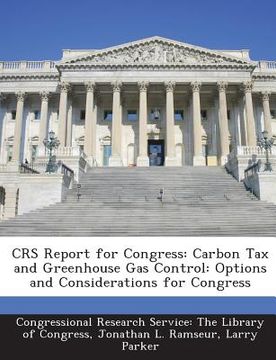Share
Crs Report for Congress: Carbon Tax and Greenhouse Gas Control: Options and Considerations for Congress (in English)
Congressional Research Service the Libr
(Author)
·
Jonathan L. Ramseur
(Author)
·
Larry Parker
(Author)
·
Bibliogov
· Paperback
Crs Report for Congress: Carbon Tax and Greenhouse Gas Control: Options and Considerations for Congress (in English) - Ramseur, Jonathan L. ; Parker, Larry ; Congressional Research Service the Libr
$ 14.95
$ 17.75
You save: $ 2.80
Choose the list to add your product or create one New List
✓ Product added successfully to the Wishlist.
Go to My WishlistsIt will be shipped from our warehouse between
Thursday, July 04 and
Friday, July 05.
You will receive it anywhere in United States between 1 and 3 business days after shipment.
Synopsis "Crs Report for Congress: Carbon Tax and Greenhouse Gas Control: Options and Considerations for Congress (in English)"
Market-based mechanisms that limit greenhouse gas (GHG) emissions can be divided into two types: quantity control (e.g., cap-and-trade) and price control (e.g., carbon tax or fee). To some extent, a carbon tax and a cap-and-trade program would produce similar effects: Both are estimated to increase the price of fossil fuels, which would ultimately be borne by consumers, particularly households. Although there are multiple tools available to policymakers that could control GHG emissionsa "including existing statutory authoritiesa "this report focuses on a carbon tax approach and how it compares to its more frequently discussed counterpart: cap-and-trade. If policymakers had perfect information regarding the market, either a price (carbon tax) or quantity control (cap-and-trade system) instrument could be designed to achieve the same outcome. Because this market ideal does not exist, preference for a carbon tax or a cap-and-trade program ultimately depends on which variable one wants to controla "emissions or costs. Although there are several design mechanisms that could blur the distinction, the gap between price control and quantity control can never be completely overcome. A carbon tax has several potential advantages. With a fixed price ceiling on emissions (or their inputsa "e.g., fossil fuels), a tax approach would not cause additional volatility in energy ..."
- 0% (0)
- 0% (0)
- 0% (0)
- 0% (0)
- 0% (0)
All books in our catalog are Original.
The book is written in English.
The binding of this edition is Paperback.
✓ Producto agregado correctamente al carro, Ir a Pagar.

